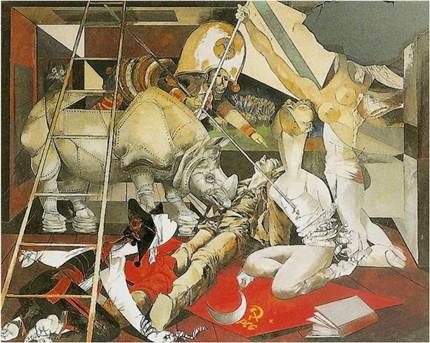A NARRATIVA DE CAIO FERNANDO ABREU E A CONFIGURAÇÃO DE UM CAMPO HOMOERÓTICO NAS ARTES BRASILEIRAS
DOI:
https://doi.org/10.48075/rlhm.v10i15.10680Palavras-chave:
Homoerotismo, Literatura e Artes, Ditadura MilitarResumo
Entre as décadas de 1960 e 70 inicia-se um processo de desmarginalização do tema da homossexualidade nas artes brasileiras. Neste artigo, buscamos analisar a configuração desse novo campo artístico, em que o desejo homoerótico passa a ser tratado de forma distinta dos discursos tradicionais e preconceituosos que sempre marcaram sua representação. Dentro desse campo, buscamos pensar como a narrativa de Caio Fernando Abreu se insere, por meio de uma escrita que legitima o desejo homoerótico, participando do advento do que seria uma “homotextualidade”, termo que serve para nomear essa nova possibilidade de representação do amor que, até então, “não ousava dizer o nome”. Aliado a outros campos artísticos e sociais, como o teatro, a imprensa e a militância política, a temática homoerótica passa a ocupar um novo espaço, ainda que em conflito com as noções então vigentes de arte engajada voltada para a conscientização da classe trabalhadora. Em conflito também com condições políticas específicas, como o recrudescimento da Ditadura em 1968 e a abertura política iniciada em fins da década seguinte. Assim, entendemos que esse novo olhar das artes sobre o tema e, especificamente, a escolha de Caio Fernando Abreu em representá-lo literariamente de forma livre, acabam por adquirir um sentido político de resistência.
Downloads
Publicado
Como Citar
Edição
Seção
Licença
Aviso de Direito Autoral Creative Commons
Política para Periódicos de Acesso Livre
Autores que publicam nesta revista concordam com os seguintes termos:
1. Autores mantém os direitos autorais e concedem à revista o direito de primeira publicação, com o trabalho simultaneamente licenciado sob a Licença Creative Commons Attribution que permite o compartilhamento do trabalho com reconhecimento da autoria e publicação inicial nesta revista.2. Autores têm autorização para assumir contratos adicionais separadamente, para distribuição não-exclusiva da versão do trabalho publicada nesta revista (ex.: publicar em repositório institucional ou como capítulo de livro), com reconhecimento de autoria e publicação inicial nesta revista.
3. Autores têm permissão e são estimulados a publicar e distribuir seu trabalho online (ex.: em repositórios institucionais ou na sua página pessoal) a qualquer ponto antes ou durante o processo editorial, já que isso pode gerar alterações produtivas, bem como aumentar o impacto e a citação do trabalho publicado (Veja O Efeito do Acesso Livre).
Licença Creative Commons
Esta obra está licenciada com uma Licença Creative Commons Atribuição-NãoComercial-CompartilhaIgual 4.0 Internacional, o que permite compartilhar, copiar, distribuir, exibir, reproduzir, a totalidade ou partes desde que não tenha objetivo comercial e sejam citados os autores e a fonte.


